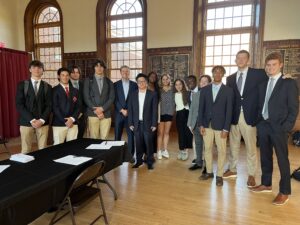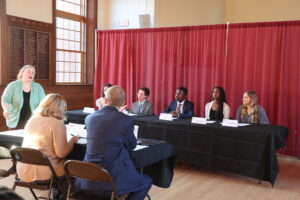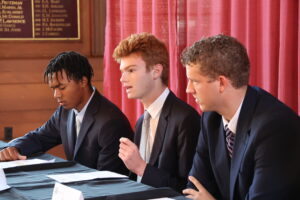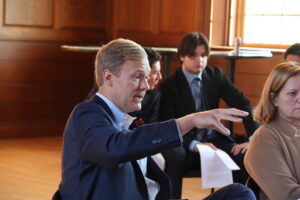October 30, 2024
CT Speaker of the House Matt Ritter Attends “We the People” IMPACT Class
Recently, Connecticut Speaker of the House Matt Ritter visited the “We the People” IMPACT Class, a new initiative centered around civics and constitutional education. This was a dynamic, interactive session where the class rotated on a panel answering different topics that were presented by Upper School history teacher Steph Sperber. This class allowed students to delve into the U.S. Constitution and its evolution, focusing on key ideals such as independence, equality, liberty, and the consent of the governed.

Exploring the Constitution’s Evolution
Students in this class had been studying how the Constitution has been amended and adapted to better uphold democratic ideals over time. The discussion aimed to provide students with multiple perspectives on how these ideals translate into today’s political processes, particularly in terms of elections and political parties.
The Format of the Forum
Each group of students was assigned a specific question related to elections, political parties, or other constitutional topics. They prepared four-minute speeches to present their findings. Students were encouraged to articulate their ideas and respond to questions thoughtfully, reinforcing public speaking skills as a critical part of the learning process.
Key Topics of Debate
Students addressed some significant questions about the American electoral system, reflecting on themes such as:
Expansion of Voting Rights: Students explored how the right to vote has widened since the Constitution’s ratification, encompassing amendments like the 15th, 19th, and 26th, which granted voting rights to racial minorities, women, and younger citizens. They also discussed how these expansions reflect the ideals of equality and independence. For instance, full democracy in this country didn’t start until the 1965 Voting Rights Act, but even in 1967 in Massachusetts, if you were on public assistance, you were not permitted to vote.

Gerrymandering and Equal Protection: Another focal point was whether gerrymandering—drawing electoral districts to favor one political party—violates the Equal Protection Clause of the 14th Amendment. Students debated both sides, considering the complex relationship between fair representation and political advantage.
Electoral College vs. Popular Vote: The forum included a critical analysis of the Electoral College system. Students weighed its advantages, such as representing diverse states, against its disadvantages, like potentially undermining the popular vote. Some proposed alternatives, like a national popular vote, to ensure better representation. One student said, “It’s important to note that when the founders developed the Electoral College, it was partially because they didn’t trust the people to vote. This can lead to people feeling they are underrepresented.” One argument that was presented is that if a candidate was selected by purely a popular vote, how could people from South Dakota feel that they would be protected?
Historical Context and Modern Implications
Throughout the discussions, students provided historical context to underline how the voting landscape in the U.S. has evolved. They cited instances like Jim Crow laws, literacy tests, and poll taxes that once suppressed voter turnout among marginalized groups, illustrating the gradual progress toward a more inclusive democracy.
The students also acknowledged modern-day challenges such as partisan gerrymandering. They examined landmark Supreme Court cases, such as the 1993 case ruling racial gerrymandering unconstitutional and more recent debates on partisan gerrymandering, to discuss whether there are equitable ways to redraw districts.
CT Speaker of the House Matt Ritter’s Insights
CT Speaker of the House Matt Ritter added depth to the conversation by sharing insights into Connecticut’s own redistricting process, which is managed by a bipartisan commission. He discussed the ongoing efforts to create a more equitable process and encouraged students to think about feasible solutions for fair redistricting nationwide. Ritter emphasized that democracy is about having the right to vote and ensuring the process is transparent, fair, and representative.
An Engaging Educational Experience
The “We the People” forum was an effective blend of education and civic engagement. It allowed students to not only learn about constitutional principles but also to actively debate and propose solutions for current issues. This kind of interactive learning prepares students for future roles as informed citizens and leaders.
Overall, this forum represents a promising step in civic education, emphasizing the importance of understanding democratic processes and advocating for improvements in the political system. It also reflects a broader educational trend toward making civics more participatory, challenging, and relevant to contemporary issues.
